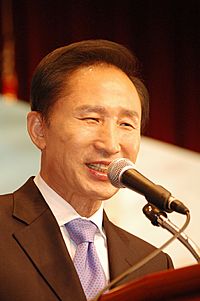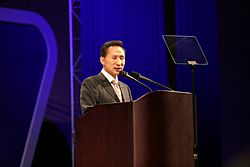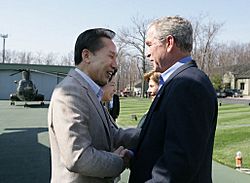Lee Myung-bak facts for kids
Quick facts for kids
Lee Myung-bak
GOM
|
|
|---|---|
|
이명박
|
|
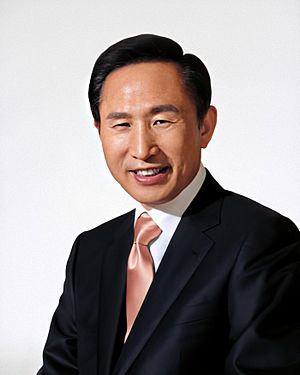
Official portrait, 2008
|
|
| 10th President of South Korea | |
| In office 25 February 2008 – 25 February 2013 |
|
| Prime Minister | Han Duck-soo Han Seung-soo Chung Un-chan Kim Hwang-sik |
| Preceded by | Roh Moo-hyun |
| Succeeded by | Park Geun-hye |
| Mayor of Seoul | |
| In office 1 July 2002 – 30 June 2006 |
|
| Preceded by | Goh Kun |
| Succeeded by | Oh Se-hoon |
| Member of the National Assembly | |
| In office 30 May 1996 – 21 February 1998 |
|
| Preceded by | Lee Jong-chan |
| Succeeded by | Roh Moo-hyun |
| Constituency | Jongno (Seoul) |
| In office 30 May 1992 – 29 May 1996 |
|
| Constituency | Proportional representation |
| Personal details | |
| Born | 19 December 1941 Osaka, Japan |
| Political party | Independent (2017–present) |
| Other political affiliations |
Saenuri (until 2017) |
| Spouse | |
| Children | 4 |
| Alma mater | Korea University (BBA) |
| Signature | |
| Korean name | |
| Hangul |
이명박
|
| Hanja |
李明博
|
| RR | I Myeongbak |
| MR | I Myŏngbak |
| Art name | |
| Hangul |
일송
|
| Hanja |
一松
|
| RR | Ilsong |
| MR | Ilsong |
Lee Myung-bak (born December 19, 1941) is a South Korean businessman and politician. He served as the 10th president of South Korea from 2008 to 2013. Before becoming president, he was the CEO of a major construction company and the mayor of Seoul, South Korea's capital city.
Lee is married to Kim Yoon-ok, and they have three daughters and one son. He is a graduate of Korea University. As president, he focused on strengthening South Korea's economy and its role in the world. He hosted the 2010 G-20 Seoul summit, which brought world leaders to Korea.
His approach to North Korea was firmer than the presidents before him. He wanted to build a strong relationship with countries like the United States, Japan, China, and Russia. After his presidency, Lee faced legal challenges related to his time in office. In 2022, he received a special pardon.
Contents
Early Life and Schooling
Lee Myung-bak was born in Osaka, Japan, on December 19, 1941. His parents were Koreans who had moved to Japan for work. After World War II ended in 1945, his family moved back to their hometown of Pohang, Korea. The journey back was very difficult, and their ship was wrecked, causing them to lose all their belongings.
Lee grew up in a poor family. He attended night school so he could work during the day. He earned a scholarship and was able to go to Korea University. In college, he was elected president of the student council. He participated in student protests against the government's policies, which he believed were unfair to Korea.
A Career in Business
In 1965, Lee began working at Hyundai Construction. The company was small at the time, with only about 90 employees. Lee was sent to Thailand to help build a highway, which was Korea's first major construction project in another country. He was very successful and quickly moved up in the company.
He became the CEO of Hyundai Construction at age 35, making him the youngest CEO in Korea's history. He earned the nickname "Raging Bulldozer" because of his determined and powerful leadership style. When he left Hyundai after 27 years, the company had grown to over 160,000 employees and was working on huge projects all over the world.
Entering Politics
Mayor of Seoul
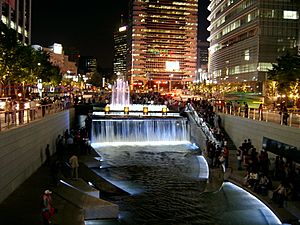
After a successful business career, Lee decided to enter politics in 1992. In 2002, he was elected mayor of Seoul. As mayor, he led several popular projects that changed the city.
One of his most famous projects was the restoration of the Cheonggyecheon stream. This stream had been covered by a highway for many years. Lee's project removed the highway and turned the stream into a beautiful public park that is now a popular spot for locals and tourists. He also created Seoul Forest, a large park in the middle of the city, and added a new system of rapid transit buses to improve transportation.
Becoming President
In 2007, Lee ran for president of South Korea. His main campaign promise was called the "747 Plan." This plan aimed for 7% economic growth each year, raising the average income to $40,000 per person, and making South Korea the world's seventh-largest economy.
He won the election by a large margin and became president on February 25, 2008. He promised to revive the economy, strengthen the relationship with the United States, and take a firmer stance with North Korea.
Presidency (2008–2013)
As president, Lee Myung-bak focused on the economy, the environment, and foreign relations. His policies were often called "Mbnomics," a mix of his initials "MB" and "economics."
Economic Policies
President Lee's main goal was to make South Korea's economy stronger. He wanted to create a "low-carbon, green growth" economy. This meant finding ways for the country to grow while also protecting the environment.
His leadership helped South Korea get through the 2008 global financial crisis better than many other countries. He also helped Korean companies win major international projects, like a $20 billion deal to build nuclear power plants in the United Arab Emirates.
Major Projects
One of Lee's biggest projects as president was the The Four Major Rivers Restoration Project. The goal was to improve the country's four largest rivers: the Han, Nakdong, Geum, and Yeongsan. The project aimed to secure water supplies, prevent floods, and improve the river ecosystems.
The project was very large and expensive. While the government said it was good for the environment, some people worried about its impact on nature. The project remains a topic of debate in South Korea.
Foreign Relations
Working with Other Countries
President Lee worked to strengthen South Korea's relationships with other countries, especially the United States. He was known to have a close friendship with U.S. President Barack Obama. Under his leadership, South Korea hosted the 2010 G-20 Seoul summit, where leaders from the world's largest economies met in Seoul. This was a major achievement that raised South Korea's profile on the world stage.
He also improved ties with other nations in Asia and Europe. In 2011, South Korea signed a free trade agreement with the European Union, which helped businesses sell more products to European countries.
Relations with North Korea
Lee took a different approach to North Korea than previous presidents. He ended the "Sunshine Policy," which had focused on friendly engagement. Instead, he adopted a firmer policy. He stated that South Korea would only provide large-scale aid if North Korea made progress on giving up its nuclear weapons program. This change in policy led to more tension between North and South Korea during his presidency.
Relations with Japan
Relations with Japan became tense near the end of Lee's term. In 2012, he became the first South Korean president to visit the Liancourt Rocks, a group of small islands that both Korea and Japan claim. The islands are called Dokdo in Korea and Takeshima in Japan. His visit angered the Japanese government.
Lee also called on the Emperor of Japan to make a sincere apology for Japan's actions during its colonial rule of Korea before visiting the country. These actions created friction between the two neighboring countries.
Legacy
Lee Myung-bak's presidency is remembered for guiding South Korea through the 2008 global financial crisis. Under his leadership, the economy recovered quickly. He also increased South Korea's influence in the world by hosting the G-20 summit and strengthening ties with other nations.
His projects, like the Cheonggyecheon stream restoration, are still enjoyed by many people today. However, some of his other policies, like the Four Major Rivers Project and his approach to North Korea, remain controversial. In recent years, many people have come to appreciate his strong leadership during the economic crisis.
See also
 In Spanish: Lee Myung-bak para niños
In Spanish: Lee Myung-bak para niños
- Lee Myung-bak rat poster incident


